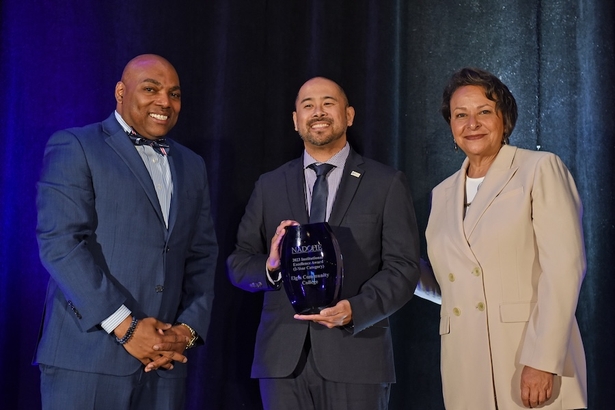Much of Elgin Community College’s history with diversity, equity, and inclusion work began shortly after the arrival of President David Sam, Ph.D., JD, LLM, over 15 years ago.
The college joined Achieving the Dream, a national network of community colleges committed to institutional change to drive student success. In 2019, ECC developed its first equity plan, which is rooted in the belief that equity ensures each student receives what they need to succeed. ECC is one of only two community colleges in Illinois named to the Aspen Institute College Excellence Program’s Top 25 for 2022-23. Additionally, ECC was named an Achieving the Dream Leader College of Distinction in 2021; the college has been a Leader College since 2012.
The institution joined NADOHE in 2021 when it hired Executive Director of Equity, Diversity, and Inclusion Anthony M. Ramos, Ph.D. Ramos participated in the Standards of Professional Practice Institute in the 2021-2022 cohort. The school is a recipient of NADOHE’s Institutional Excellence Award, Two-Year Institution for 2023. Responses below are provided by Ramos.
Why is the school a member of NADOHE?
As central to our guiding philosophies of learning, equity, diversity, inclusion, and justice, membership in NADOHE keeps the institution informed and aligned with the best practices and standards of the work of chief diversity officers. It is a critical relationship in ensuring our commitment to our mission of “improving people’s lives through learning” is centered on how we serve the rich diversity of the District 509 community.
ECC enrolls higher rates of students of color relative to the overall district diversity – 62% of ECC students are from racial minority groups compared to 42% in the entire District 509. In this context, ECC impacts the Elgin area by ensuring equitable access to higher education. ECC offers programs that attract and serve Elgin residents and recognize the unique challenges of immigrants and first-time students.
The school has an equity plan comprised of six direct student-facing strategies and one indirect student-facing strategy. Can you elaborate on what the plan entails and what those strategies are?
We are excited to share that much of what was drafted in the original equity plan in 2019 has been adopted operationally or is in the implementation stages. The equity goals and perspectives are now being embedded into various initiatives across the college, including those focused on student recruitment, retention, and success; advocacy for minoritized populations; supporting DEI in employee recruitment and development, campus culture, and community engagement.
Our work has moved from a set of defined recommendations to an implementation team that has accomplished most of their recommendations in building future capacity for reducing textbook and course material costs. Faculty development through the Teaching/Learning for Inclusion, Diversity, and Equity (TIDE) group is an ongoing operational activity within our Center for the Enhancement for Teaching, Assessment, and Learning. Direct student programs such as the Mandatory Advising Program and the Complete to Compete Scholarship program are institutionalized in practice.
What are some future diversity, equity and inclusion initiatives planned for the school?
Our various work teams have now been moved under the Equity, Diversity, and Inclusion Office under the Equity and Student Success Action Council umbrella. The council is representative of groups that start as strategy teams to incubate solutions to ongoing EDI and student success concerns and then transition to implementation teams to enact those solutions.
This new structure ensures that urgency is key in addressing equity concerns and accelerates action rather than letting ideas sit in committees for extended periods of time. Strategy teams have one to two years to research and make recommendations, then move to implementation with an evaluation plan in place to measure impact. Example strategy teams include the Undocumented Student Success team, while Textbook and Course Material Cost Reduction is one of the implementation teams.
Know a NADOHE member who deserves recognition? Submit your Member Highlight suggestions to info@nadohe.org.

